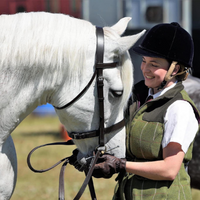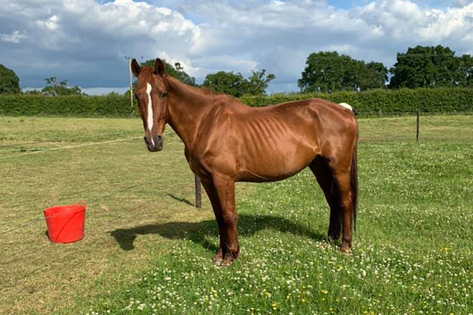
Are You & Your Horse Ready For Bitting Advice? The Steps You Need To Consider First
Equestrian Advice & Guides All Disciplines
Build your business profile for FREE and expose your services to thousands of potential clients!
Create my profile now!
Often, on wanted adverts, people restrict the age of the horses they’re willing to look at, overlooking older horses. A ‘veteran’ is considered to be any horse or pony that’s 15 or older, but it’s often not as clear cut as that and comes down to the condition of the horse at that age.
Veteran horses and ponies have so many wonderful qualities – they tend to have seen and done more than younger horses, making them a little more experienced and usually more sensible! Veterans can be great first ponies; my first pony was 18 when we bought him and he taught me everything I know.
That said, veterans do sometimes need some additional support.
Older horses often develop arthritis of the joints and can become a little bit stiff, so they may need that extra 5 minutes to warm up when riding. Lots of school moves in walk (figure of 8, 3 loop serpentine etc) and long and low stretching is perfect to give a veteran a bit of extra time to warm up.

They may actually benefit from stretching before you get on too. There are a handful of really easy stretches that anyone can do from the ground; they’re beneficial for all horses but are especially good for older or slightly stiffer ones.
 “Carrot stretches” involve using a treat to encourage your horse to stretch its head round to the left flank and the right flank. You can also place the treat between the horse’s knees to encourage them to stretch downwards – make sure they’re happy with you doing this first.
“Carrot stretches” involve using a treat to encourage your horse to stretch its head round to the left flank and the right flank. You can also place the treat between the horse’s knees to encourage them to stretch downwards – make sure they’re happy with you doing this first.
You can also help support older joints by supplementing their diet with a joint supplement. There are 100’s on the market, but make sure you take note of the active ingredients and the quantity of each that is present. Anything with a high level of glucosamine is a winner for joints!
As with younger horses, regular physiotherapy can also help provide relief to any joints or other areas that may get especially stiff, sore or need a bit of extra TLC.
If you find your veteran gets stiffer in the winter, make sure you provide them with some optional shelter from the bad weather and be sure to keep them warm and dry with good rugs, as the colder they get, the stiffer they can become. It’s particularly important to make sure any rugs used are still fully waterproof to ensure they provide effective protection. Adding a field shelter is a great option to ensure they have protection from extreme weather conditions all year round. If your horse is stabled, a deeper bed helps to keep them warm and prevent discomfort.
 Weight loss is a common problem in older horses, leaving them with less fat to insulate themselves from the cold, so keeping them warm in all conditions, whether inside or out, also ensures reduced energy loss and in turn, helps to prevent further weight loss.
Weight loss is a common problem in older horses, leaving them with less fat to insulate themselves from the cold, so keeping them warm in all conditions, whether inside or out, also ensures reduced energy loss and in turn, helps to prevent further weight loss.
The most common cause of weight loss is insufficient food intake, however, it can also be the first indicator of ill health. It’s important to ensure you are weighing your veteran regularly and noting any obvious changes to their condition; weight tapes can provide a good estimate if weighing regularly isn’t possible. Take note of any fluctuations in water intake and appetite, or even a change in the appearance of their droppings, as changes can often indicate an underlying problem.
If you are concerned about weight loss, you should have your horse checked by both a vet and a dentist so that they can diagnose the cause of the weight loss and treat it accordingly.
It is also really important to keep on top of a veteran’s dental care. Older horses often struggle to eat preserved forages like hay and haylage which are important for maintaining adequate calorie intake, as their teeth wear down with age, again, creating the potential for further weight loss.
 Regular dentistry with a fully qualified dentist or veterinary dentist is essential to spot any problems, hopefully before they become a real issue. This should be done at least twice a year.
Regular dentistry with a fully qualified dentist or veterinary dentist is essential to spot any problems, hopefully before they become a real issue. This should be done at least twice a year.
If your veteran does struggle to eat hay, you can still ensure they get the right amount of fibre and nutrients by using a hay replacer. Fibre mashes are highly popular with veteran owners; you can get various kinds of mash, such as fibre cubes, veteran mash and grass nuts. These come in a pellet form and are soaked with water to form a soft, easy to eat mash. You can even soak them in warm water over the winter to give your golden oldie a nice warm tea! They ensure your horse gets the right amount of calories and fibre, without you having to worry that they won’t be able to eat all their hay overnight. I currently have my underweight veteran on a Veteran Vitality mash and she has absolutely flourished on it.

Whether your elderly horse is still shod and competing or not, as with all horses, they will need to continue to be wormed, vaccinated and have their feet trimmed regularly. Frequent worming is particularly important for older horses as their immune systems may have been weakened, making them more susceptible to conditions like worms. Your vaccination program should also be maintained to keep tetanus at bay, and more importantly, to prevent against influenza, which can be fatal in older horses. Regular farriery also remains important and trimming the feet right back can be especially helpful for horses suffering from arthritis as it will make movement much easier.
Keeping on top of your veteran’s care routine will help prevent deterioration of both the horse’s immune system and their overall condition.
The following photos show my 16 year old Amber when I first got her in comparison to now, only a month from bringing her home. This demonstrates that veterans can easily be put on the right track with proper nutrition and dental care.

With the correct care, there is absolutely no reason why older horses cannot compete at the same level as younger ones; there’s even a society specifically for older horses! If you like to show and have a veteran, the Veteran Horse Society has its own qualifiers you can aim for. Veterans make fabulous first ponies, wonderful showing stars and experienced showjumpers – there’s nothing they can’t do!


